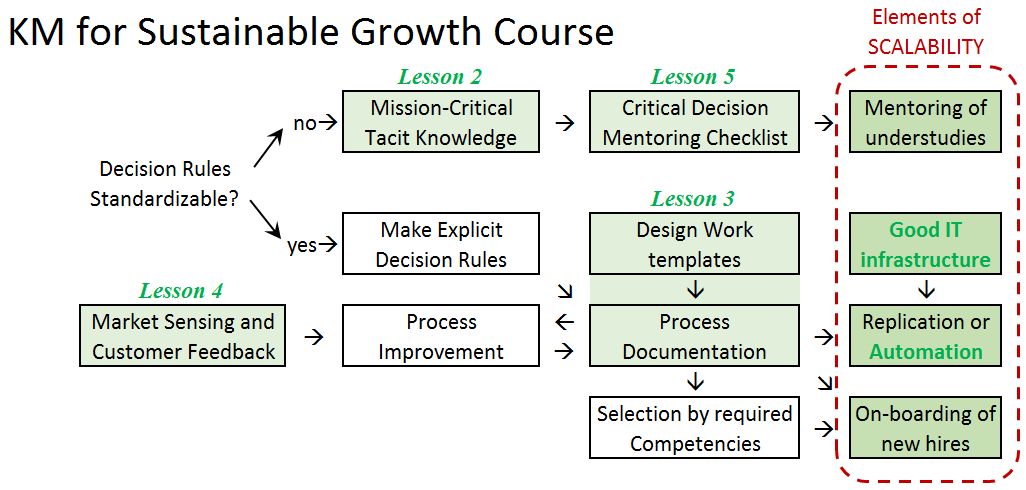The course on Knowledge Management for Sustainable Growth (KM4SG) builds corporate capacities towards growth, innovation and scalability.

It is intended for managers from the same company. Enrolment is not individual but by arrangement with the company. Contact info@cclfi.net for information or for making arrangements for a class.
This course is both basic and applied. It covers basic concepts and principles in knowledge management (KM) and at the same time it applies these principles on participants' workplaces through class discussions on Practical Workplace Questions. These questions are selected to focus on how KM can be applied for sustainable growth of the company. To be more specific, the objectives of the Course are:
- Strengthen organizational capacities for expansion of business operations;
- Train managers of core business processes in workplace practices to (a) scale up production capacity, (b) to plan for mentoring of understudies in critical decision making skills for sustaining operations, and (c) anticipate HR or human resources risks and vulnerabilities that may affect productivity;
- Provide workplace experiences for managers in sensing opportunities for innovating new products or services as well as anticipating possible disruptions from competitors.
The course consists of six KM topics over six weeks and analysis of a KM case study in the last or seventh week. Participants can access the course website at any time during the week, spending a total of about three hours per week. The learning processes consist of reading the weekly lesson, interacting online with classmates on the Practical Workplace Question at the end of a lesson, preparing team reports based on the class interaction around the Practical Workplace Question, and consulting the online Course Mentor. A team is organized for each of the six Practical Workplace Questions; participants sign up in their team of choice during the first week. The six team reports are tangible class output that the class can submit to the VP for HR and the CEO at the end of the course, copy furnished their respective superiors.
The six KM topics and the KM case study are:
1. KM Framework
Practical Workplace Question: What are the top demotivators among company rank and file? (from an informal/anonymous survey by a trusted subordinate)
2. Tacit and Explicit Knowledge
Practical Workplace Question: Short list of mission-critical tacit knowledge in the company
3. Alignment of KM to Organizational Goals
Practical Workplace Question: Checklist for replicating a core business process
4. Demand-driven KM
Practical Workplace Question: Identify customer problems that require product redesign (based on CSAT responses or customer complaints logbook)
5. Organizational Learning
Practical Workplace Question: Design a critical-decision checklist for mentoring an assistant manager
6. Innovation
Practical Workplace Question: Class exploration on what possible innovations by competitors can disrupt the current business model of the company
7. Class discussion on a case study: Sustainability of Growth of "Widget Company".
Class participation is monitored and recorded by the online Course Mentor through an online M&E (monitoring and evaluation) worksheet.
Some Feedbacks from Past Participants
“...these are valuable lessons that are practical and easily applicable...”
“Overall, I appreciate the objectives of the program and its relevance to the current projects the organization is undertaking...”
“The examples and illustrations were very helpful...”
“I like the buildup of the lessons - like a story line so it is easy to link previous lesson to the next.”
Below are some feedbacks on the Practical Workplace Question as a learning device. Please note that this course participants is designed to be participated by managers from various units of the same organization.
“Multiplies my knowledge on company processes (specially other departments) by going through the discussions and even suggestions on innovations to smoothly connect from one department to other departments until the job is done.”
“In depth analysis of the problems experienced in the organization.”
“I learned from other departments’ processes, their roles in our company and importance.”
“It enabled me to understand the complexities of each department we handled and how each of the issues where addressed.”
